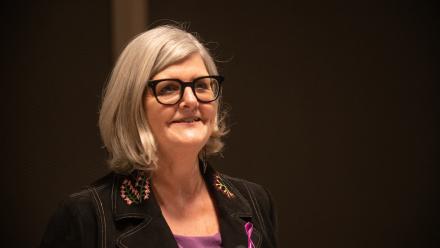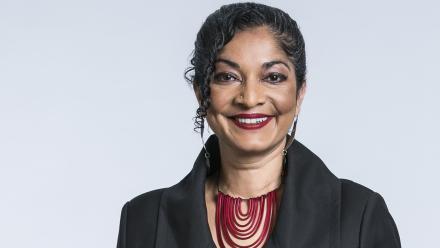Referring back to the USSR
Carrington Clarke (BA/BEc '04)
13 Dec 2022
I was working as North America Correspondent for the ABC in the week former Soviet Union leader Mikhail Gorbachev died. The news came in late, our European bureau had departed for the day, and from our office in Washington I needed to go live to discuss the death of Gorbachev. With limited opportunity to read much about him, I was thankfully able to fall back on my arts degree from The Australian National University (ANU) where I had taken a course in Russian history.
Being able to talk about Gorbachev's political career, and the issues that led to the fall of the Union of Soviet Socialist Republics (USSR) with some confidence was comforting. It also reminded me of the great benefit of my degrees, and the breadth of education you receive at ANU.
When you grow up in Canberra, ANU is a constant. A beacon of excellence well known throughout the nation's capital, and a little piece of Canberra that is widely revered throughout the world. I've come to acknowledge this the more time I spend away from home, having now worked in South Korea and the US, and recognise that being an ANU graduate opens networks and opportunities like no other, especially for a career in journalism.
On leaving ANU with a double degree in arts and economics in 2009, I worked as an economist in the public service in Canberra and then Sydney, before the long-held desire to be a journalist took over.
Studying at ANU has provided me with a strong foundation, and it's hard to imagine where I would be without them. ANU is a fantastic institution with a lot of cachet around the world. People know the institution in other countries and often when I speak to experts, particularly about economics, it helps that they know I studied at ANU. They take me a little bit more seriously, which has proven especially helpful in getting some people across the line for interviews and allows for more informed discussions.
The breadth of the education I received at ANU was extremely important and my degrees are 100 per cent relevant to almost everything I do as a journalist. I do have a strong interest and background in economics and finance issues, and that's been helpful at a time where interest rates are rapidly being hiked, causing a huge amount of pain for many people here, but also around the world. Having an academic background from ANU has helped me explain what central banks are trying to do, and what the forces are at work with inflation. The background I got in political science and international relations, and even the Spanish I learned as part of my arts degree, has also been beneficial.
Even more important than the subjects you study at ANU, is the fact that you learn how to learn, how to approach problem-solving, to do your own research, and to critically analyse. These are probably the most important skills for a journalist, so I was very fortunate to go to a university with the ANU's standing, and obviously learn from the lecturers and academics that work there, because it means I now have the confidence to talk about a broad range of issues that are directly relevant to my job.
While it's nice to look back on things like O-Week celebrations or the amazing gigs held on campus, on further reflection one of the great joys of ANU is that you have experts in their field teaching you. For me, that is one of the most important aspects of the educational experience. ANU is an expert-rich faculty, and you have the amazing opportunity of learning from those experts in the sedate and serene surrounds of Canberra.
You can follow Carrington on LinkedIn at https://www.linkedin.com/in/carringtonclarke/
Other stories you might like to read
Page Owner:
Alumni


